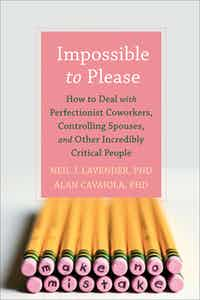A Letter from Neil Lavender, Phd, and Dr. Alan Cavaiola, PhD
After we wrote Toxic Coworkers: How to Deal with Dysfunctional People on the Job, we had the opportunity to speak with many people who were coping with individuals who had personality disorders both in and out of the workplace. We were surprised to find out that the majority of those we spoke with during our workshops were most troubled by people who are often referred to as “controlling-perfectionists.” This complaint was reiterated in our psychotherapy practices: more and more we heard that controlling perfectionists hurt those around them with their unrealistic demands, compulsively spewed criticisms, and dogged attempts to control others. They seemed to be particularly destructive in close relationships—such as those with spouses, parents, friends, and siblings—as well as in the workplace.
 In our new book, Impossible to Please: How to Deal with Perfectionistic Coworkers, Controlling Spouses, and Other Incredibly Critical People, we offer many solutions to those dealing with these types of people. One solution is called the three “C”s. Controlling perfectionists actually are not used to people arguing with them and trying to prove that they are wrong. This only inflames their own insecurities. In this solution, you invite the controlling perfectionist to collaborate on a win-win basis.
In our new book, Impossible to Please: How to Deal with Perfectionistic Coworkers, Controlling Spouses, and Other Incredibly Critical People, we offer many solutions to those dealing with these types of people. One solution is called the three “C”s. Controlling perfectionists actually are not used to people arguing with them and trying to prove that they are wrong. This only inflames their own insecurities. In this solution, you invite the controlling perfectionist to collaborate on a win-win basis.
So these are the three “C”s:
Case: Here you state what you believe the problem is, making your “case.”
Clarification: Here you are inviting the controlling perfectionist to clarify his view.
Commit: Once both cases or points of view are discussed and clarified, you then come up with a solution or agreement to which you’re both willing to commit.
Most of us are faced with two unpleasant choices when dealing with a controlling perfectionist. One is to avoid them completely. Sometimes this is unrealistic, however. Another approach is to simply let ourselves fall victim to their unceasing criticisms and carping. Effective boundary setting enables you to keep the bad stuff out of your relationship and let the good stuff in, thereby offering a third choice. We try to avoid a one-size-fits-all approach; instead, we offer our readers a way of setting boundaries that are consistent with their own personal styles of communication. We hope that you find this book a valuable addition to your personal library!


 2024 Peace Playbook: 3 Tactics to Avoid Clashes with Your Partner
2024 Peace Playbook: 3 Tactics to Avoid Clashes with Your Partner